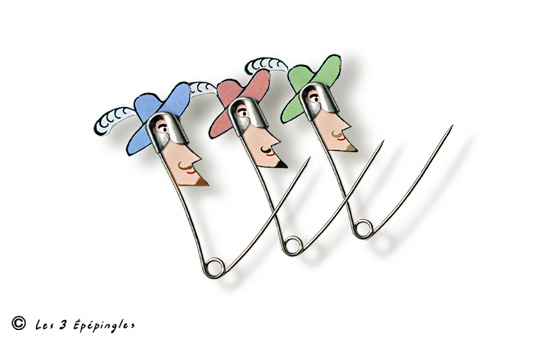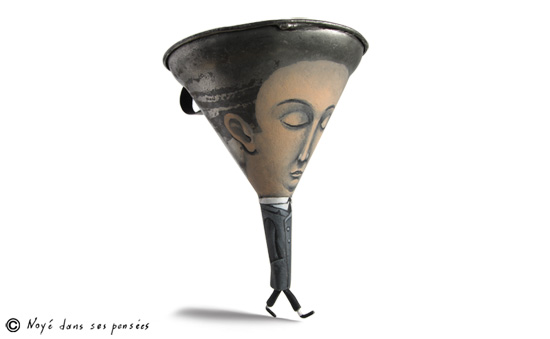An essay of mine in ENG2334 at UiO.
“I am an invisible man...” (Ellison 1952, 3)
Thus Invisible Man begins. The first sentence of Ralph Ellison’s novel
strikes one as an illusion to Dostoevsky’s Notes
from Underground, which starts with “I am a sick man... I am a wicked man.
An unattractive man.” (Dostoevsky 1993, 3) These two books, having more
similarities than the first lines, will be compared and contrasted in this
essay to show that Ralph Ellison is possibly inspired or influenced by Notes from Underground, not only the
underground imagery but also its main themes of alienation, existence and identity,
and can be called Notes from Underground
America.
At first sight, Invisible Man and Notes from Underground appear to be very different. Invisible Man, written by Ralph Ellison
and published in 1952, is narrated by a black man in the US; Notes from Underground by Fyodor Dostoevsky,
published in 1864, is narrated by a retired civil servant living in St
Petersburg a century earlier. Invisible
Man deals with racism and racial stereotypes; Notes from Underground is not concerned with race. Invisible Man is born of Ralph Ellison’s
disillusionment with the communist party, of which he used to be a member
(Polsgrove); Notes from Underground
is Dostoevsky’s response to What Is to Be
Done? by Nikolai Gavrilovich Chernyshevsky (Pevear 1993). Invisible Man consists of over four
hundred pages; Notes from Underground is
a mere novella, having just over one hundred pages.
However one may find
similarities. Both books have the form of a confession. Both books have a
nameless narrator, who, whilst writing, stays underground, away from society.
Both books begin with the present and go back about twenty years. Both have an
angry, bitter and conflicted tone.
The comparison might appear a
little far-fetched as these superficial similarities could be seen as random
and accidental, but there are more underneath the surface. In Invisible Man, there is an important
scene, in which the narrator, to whom we can refer as the invisible man, bumps
into a person:
“One night I accidentally bumped into a man, and perhaps
because of the near darkness he saw me and called me an insulting name. I
sprang at him, seized his coat lapels and demanded that he apologize. [...] I
butted him again and again until he went down heavily, on his knees, profusely
bleeding. I kicked him repeatedly, in a frenzy [...] And in my outrage I got
out my knife and prepared to slit his throat [...] when it occurred to me that
the man had not seen me, actually; that he, as far as he knew, was in the midst
of a walking nightmare!” (Ellison 1952, 3-4)
This scene is reminiscent of a
similar scenario in part two of Notes
from Underground:
“I was standing beside the billiard table, blocking the way
unwittingly, and [an officer] wanted to pass; he took me by the shoulders and
silently- with no warning or explanation- moved me from where I stood to
another place, and then passed by as if without noticing. I could even have
forgiven a beating, but I simply could not forgive his moving me and in the end
just not noticing me.” (Dostoevsky 1993, 49)
The insult of being treated like
an object bothers the narrator, whom we can call the underground man, for
years. The invisible man is also underground and the underground man is also
invisible, but if the invisible man reacts immediately, with hatred and
violence, the underground man carries anger and spite within himself as he
follows the officer and learns about his ‘enemy’. It torments him that for a
long time the officer still fails to see him, and he himself always has to
swerve and make space for the officer, so one day a thought occurs to him “What
if I meet him and... do not step aside? Deliberately do not step aside, even if
I have to shove him- eh? How will that be?” (ibid, 53) After some struggle and
preparation, he finally does it:
“Suddenly, within three steps of my enemy, I unexpectedly
decided, closed my eyes, and- we bumped solidly shoulder against shoulder! I
did not yield an inch and passed by on a perfectly equal footing! He did not
even look back and pretended not to notice: but he only pretended, I’m sure of
that. To this day I’m sure of it! Of course, I got the worst of it; he was
stronger, but that was not the point. The point was that I had achieved my
purpose, preserved my dignity, yielded not a step, and placed myself publicly
on an equal footing with him.” (ibid, 55)
This scenario has the absurd, comic
quality that is absent in Invisible Man,
but the idea is the same, and both scenes are significant in helping understand
the narrators and introducing the main theme of the novels. The invisible man
says “... you often doubt if you really exist. [...] It’s when you feel like
this that, out of resentment, you begin to bump people back. And, let me
confess, you feel that way most of the time. You ache with the need to convince
yourself that you do exist in the real world, that you’re a part of all the
sound and anguish, and you strike out with your fists, you curse and you swear
to make them recognize you...” (Ellison 1952, 3) Through these lines one can
see that even though the two books deal with different kinds of people,
different societies, different issues, both narrators feel invisible and alienated
from society and crushed by external forces, and both do all they can to feel
alive, to affirm their own existence and individuality. It is this theme that
unites the two works.
Notes
from Underground is divided into two parts. The second part, “Apropos of
the Wet Snow”, is a narrative. The first part “Underground”, on the other hand,
is written in the form of a diary, or an essay, which is an explicit attack on What Is to Be Done? in particular and
utilitarianism, utopianism and Western philosophy in general. As argued by the
underground man, utilitarians attempt to show people how to live and to make
decisions in life, without taking into account the most important aspects of
human nature that human beings are self-contradictory and irrational, and, in
the underground man’s words, stupid and ungrateful. People, even when well
aware of their real profit, “would put it in second place and throw themselves
onto another path, a risk, a perchance” only because they do not want a
designated path (Dostoevsky 1993, 20-1). The underground man argues:
“Shower [a man] with all earthly
blessings, drown him in happiness completely, over his head, so that only
bubbles pop up on the surface of happiness, as on water; give him such economic
satisfaction that he no longer has anything left to do at all except sleep, eat
ginger bread, and worry about the noncessation of world history- and it is
here, just here, that he, this man, out of sheer ingratitude, out of sheer
lampoonery, will do something nasty. [...] It is precisely his fantastic dreams,
his most banal stupidity, that he will wish to keep hold of, with the sole
purpose of confirming to himself (as if it were so very necessary) that human
beings are still human beings and not piano keys...” (ibid, 30)
To the philosophers that the
underground man critiques, the individual is not important. Invisible Man, albeit not dealing with
utilitarians, tackles the same theme- in the communist party, known as the
Brotherhood in the novel, the individual does not matter as each member must sacrifice
for the party and, before taking an action, must think of its consequences for
the party. To the Brotherhood, Tod Clifton is no more than a traitor, and the
dolls he sells, which harm the prestige of the organisation, annul all of his
good work. The invisible man also gets outraged, even more, but, unlike them,
organises a funeral for him because in spite of everything Tod Clifton has been
a brother, a human being, an individual, “jam-full of contradictions” (Ellison
1952, 353). This act may be seen as irrational, but human beings can sometimes
do things that they know are irrational and unprofitable when they feel that
those are the right things to do. The Brotherhood, however, fail to understand
it; as they think in terms such as discipline and sacrifice, to them the
concepts of personal responsibility and the individual do not exist. It becomes
clearer when they later abandon Harlem, making the narrator realise that
everything they do is for the Brotherhood, not for its members, nor for the
group they claim to represent.
Like Dostoevsky, Ralph Ellison
dissects idealistic, utopian philosophy, and through the characters in his
book, demonstrates the two ways of thinking, the former of which prioritises
the common good and the latter stresses the individual, and depicts the clash
between them. From Notes from Underground,
Ralph Ellison not only uses the underground imagery but, more importantly, also universalises
the experience of alienation and applies Dostoevsky’s socio-political commentary
on nineteenth century Russia to his society, to his time and to the communist
party. Then he pushes the concept of individuality further in his exploration
of racism and racial stereotypes.
At the beginning of Invisible Man, the narrator introduces
himself “I am invisible, understand, simply because people refuse to see me.
Like the bodiless heads you see sometimes in circus sideshows, it is as though
I have been surrounded by mirrors of hard, distorting glass. When they approach
me they see only my surroundings, themselves, or figments of their imagination-
indeed, everything and anything except me.” (ibid, 3) He is unseen rather than
invisible- the white characters look at the narrator and see nothing beyond his
skin colour. He is seen as a source of entertainment for people at the battle
royal; by Mr Norton as one of the people connected to his own destiny, as “a
mark on the score-card of [his] achievement, a thing and not a man” (ibid, 73);
by Brother Jack as a speaker who can be of some use to the Brotherhood,
especially one with dark skin, who can attract the black community; by a man in
the Brotherhood as a natural singer because “All colored people sing” (ibid,
237); by Emma as not black enough for his work; by Sybil as a figure out of her
rape fantasies. Being thus labelled, he is more like an emblem than a person
with a unique self, complexities and contradictions.
Other black characters suffer
from the same fate. Jim Trueblood has to tell over and over again the story of
how he impregnated his own daughter- his act, morally wrong and unacceptable in
a white man, becomes entertaining when done by a black man because it confirms
what some whites want to believe blacks to be, the same way Sybil asks the
narrator to verify her stereotype of black men as excitingly aggressive
savages. Tod Clifton gets killed by the police because of his skin colour, at
least according to the narrator.
More interestingly, this way of
perceiving also extends to the black characters in the book- Ralph Ellison does
not create a simplistic picture where only whites can be cruel to blacks. Dr
Bledsoe wants the narrator to be part of his ‘mission’, to succeed and to
conceal from white people all the bad sides of blacks, and thus punishes the
narrator for failing the task. Mary treats him kindly because he is as black as
she is, but keeps putting pressure on him by wanting him to do “something
that’s a credit to the race” (ibid, 194). Ras the Exhorter sees him as a
traitor for siding with whites instead of joining black nationalists such as
Ras himself. Even in the eyes of people of his own race, the narrator is
invisible. It is even worse and more painful because it is Dr Bledsoe, not Mr
Norton, that expels him and robs him of opportunities, and later, it is Ras,
not Brother Jack or another white member of the Brotherhood, that attacks him
physically.
In confusion and distress, the
invisible man learns about the existence of a man named Rinehart, who is
simultaneously a lover, a runner, a gambler, a briber and a reverend. At first,
he is enchanted with the idea of multiple identities, which to him mean endless
possibilities. Only later does it dawn on him that he has always been like
Rinehart, adjusting himself in accordance with other people, conforming to Dr
Bledsoe, saying yes to the Brotherhood, enacting Sybil’s fantasies, etc, and
that having multiple identities is equivalent to having no identity at all.
Having realised his own
conformity to other people’s expectations, he goes to great lengths to feel
alive, to feel his own existence. Dostoevsky’s underground man does the same. The
difference is that Dostoevsky’s character does nasty things and then torments
himself and, like a masochist, finds pleasure in humiliation and suffering, as
it makes him feel alive and feel like a human being who refuses a designated
path; whereas Ralph Ellison’s character, albeit violent now and then, has a
more healthy way, such as filling his place with light (using 1369 lights)
because “It allows me to feel my vital aliveness” (ibid, 6), or listening to
five recordings at the same time because “when I have music I want to feel its
vibration, not only with my ear but with my whole body” (ibid). In the end,
whereas “Notes from Underground” has no indication that the narrator will ever
leave his place, the invisible man says in the epilogue “At first you tell
yourself that it’s all a dirty joke, or that it’s due to the ‘political
situation’. But deep down you come to suspect that you’re yourself to blame,
and you stand naked and shivering before the millions of eyes who look through
you unseeingly. [...] But live you must, and you can either make passive love
to your sickness or burn it out and go on to the next conflicting phase.” (ibid,
434-5) Then he expresses his intention of leaving the underground “I’m shaking
off the old skin and I’ll leave it here in the hole. I’m coming out, no less
invisible without it, but coming out nevertheless.” (ibid, 438-9) He says it in
a matter-of-fact way, shaking off his naiveté and illusions. Ralph Ellison’s
character, besides, is different from Dostoevsky’s underground man, who is
incapable of love, as can be seen in the chapters with Liza. He says “in spite
of all I find that I love. [...] I’m a desperate man- but too much of your life
will be lost, its meaning lost, unless you approach it as much through love as
through hate. [...] So I denounce and I defend and I hate and I love” (ibid,
437-8). After all the disappointment and bitterness, Invisible Man ends in a more positive and hopeful tone.
In conclusion, Invisible Man can be called Notes from Underground America. However,
it is an adaptation, expansion, extrapolation, rather than an imitation, of Dostoevsky’s
novel. Ralph Ellison found inspiration, and created his own masterpiece.
Bibliography
Ellison, Ralph. Invisible
Man. New York: Random House, 1952.
Dostoevsky, Fyodor. Notes from Underground. Translated by Richard Pevear and Larissa
Volokhonsky. London: Vintage, 1993.
Pevear, Richard. Foreword to Notes from Underground, by Fyodor Dostoevsky, vii- xxiii. London:
Vintage, 1993.






















































